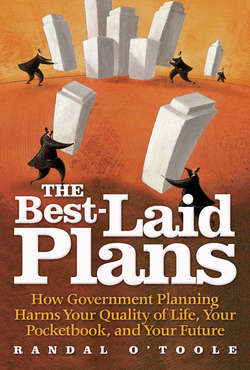The Best-Laid Plans

Реклама. ООО «ЛитРес», ИНН: 7719571260.
Оглавление
Randal O'Toole. The Best-Laid Plans
Acknowledgments
Introduction
Part One. Forest Planning
1. The Case of the Fake Forests
2. Garbage In, Gospel Out
3. A Process of Natural Selection
Clearcutting
Herbicides
Below-Cost Timber Sales
Roadless Areas
Nondeclining Flow
4. Analysis Paralysis
5. The Return of Fire Dominance
Part Two. Why Planning Fails
6. Radical Doctrine or Rational Decisionmaking?
The Data Problem
The Forecasting Problem
Planners have no better insight into the future than anyone else
The Modeling Problem
Before a model becomes complicated enough to be useful for planning, it becomes too complicated for anyone to understand
The Pace-of-Change Problem
Reality changes faster than planners can plan
7. Human Barriers
The Fad Problem
The Pseudoscience Problem
The Democracy Problem
The Decisionmaker Problem
8. Planning Is Not Necessary
Part Three. Land-Use Planning
9. Urban Renewal
10. Turning Portland into L.A
11. How Smart Is “Smart Growth”?
12. Smart Growth as Oppression
13. Homeownership
14. Housing Affordability
15. Housing Bubbles
16. It’s Supply, Not Demand
17. Portland Housing
18. Smart Growth and Crime
19. Portland Planning Implodes
Part Four. Why Planners Fail
20. The Planning Profession
The Design Fallacy
Slow to Learn
21. The History of Planning
22. The Ideal Communist City
23. Urban Renewal in the United States
24. From Radiant City to Smart Growth
25. Typical Planning Methods
Part Five. Transportation Planning
26. Planning vs. Chaos
27. The Benefits of the Automobile
Mobility
Incomes
Freight Transport Costs
Consumer Costs
Consumer Goods
Social and Recreational Benefits
Health and Safety
Freedom
Land Use
28. Costs Exaggerated
29. The Panic over Peak Oil
1. Are We Running Out of Oil?
2. Are There No Substitutes for Oil?
3. Will Higher Prices Necessarily Mean Less Driving?
4. Will Less Driving Favor New Urbanism over Low-Density Suburbs?
There’s a Ford in Your Future
30. Planning for Congestion
31. Building Auto-Hostile Streets
32. The Rail Transit Hoax
33. Transportation Myths
Part Six. Why Government Fails
34. Power and Rationality
35. Legislators: Seeking Reelection
36. Special Interests: Looking for Handouts
37. Bureaucrats: Maximizing Budgets
38. The Executive: Distracted by Detail
39. Courts and Voters: The Last Lines of Defense
Part Seven. Instead of Planning
40. 246 Varieties of Cheese
41. Make the Market Work
42. Turn Open-Access Resources into Property
43. Protect Public Goods with Trusts
44. Understand Government’s Limits
45. Reforming Public Land Management
46. Reforming Transportation
What Congress Should Do
What the Administration Should Do
What State and Regional Governments Should Do
What Transit Agencies Should Do
47. Reforming Land Use
What States Should Do
What Local Governments Should Do
48. The American Dream
Notes. Introduction
Part One
Chapter 1
Chapter 2
Chapter 3
Chapter 4
Chapter 5
Part Two
Chapter 6
Chapter 7
Chapter 8
Part Three
Chapter 11
Chapter 12
Chapter 13
Chapter 14
Chapter 15
Chapter 16
Chapter 17
Chapter 18
Chapter 19
Part Four
Chapter 20
Chapter 21
Chapter 22
Chapter 23
Chapter 24
Chapter 25
Part Five
Chapter 26
Chapter 27
Chapter 28
Chapter 29
Chapter 30
Chapter 31
Chapter 32
Chapter 33
Part Six
Chapter 34
Chapter 35
Chapter 36
Chapter 37
Chapter 38
Chapter 39
Part Seven
Chapter 40
Chapter 41
Chapter 42
Chapter 43
Chapter 44
Chapter 45
Chapter 46
Chapter 47
Отрывок из книги
This book should not be necessary. There are already many good books about why government planning does not work. Yet despite books such as Friedrich Hayek’s 1944 The Road to Serfdom and James Scott’s more recent Seeing Like a State, federal, state, and local governments continue to plan. So it is time to say, once again, that the emperor of planning has no clothes.
While the story’s outline may be familiar to some, I hope the details in this book will be fresh. My education in planning comes from three decades of often-painful experiences with land-use and transportation planners. I hope that some of this book’s readers will be able to learn through my experiences rather than having to repeat the process.
.....
Americans routinely translate the Robert Burns poem that introduces this book as “the best-laid plans of mice and men.” Yet the word that Burns uses is “scheme.” My dictionary reveals that in the United Kingdom, including Canada, Australia, and Burns’s Scotland, “scheme” means “a plan, policy, or program carried out by a government or business.” But in the United States, the dictionary adds, “scheme” has a dark undertone; it is “a secret and cunning plan, especially one designed to cause damage or harm.”2 British politicians may scheme to their hearts’ content, but American politicians caught scheming are soon voted out of office if they don’t resign first.
The ultimate goal of this book is to inspire federal, state, and local governments to repeal planning laws and shut down their planning departments as not only a burden on taxpayers but also a source of costly mistakes. In the short run, I will consider this book a success if it leads more people to view long-range, comprehensive government planning with the same suspicion they give to cunning and sinister schemes.
.....